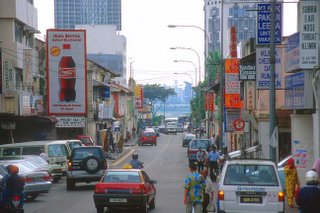Hamas = violence?
 Upon reading two commentaries on Hamas’s sweeping victory in Palestinian election made by Straits Times and New Straits Times, the disparity in the attitudes of Muslim and non-Muslim intellectuals towards Hamas, the militant group, is conspicuous.
Upon reading two commentaries on Hamas’s sweeping victory in Palestinian election made by Straits Times and New Straits Times, the disparity in the attitudes of Muslim and non-Muslim intellectuals towards Hamas, the militant group, is conspicuous.Commentators in NST have been very supportive since the organisation announced that it will participate in the election. They hailed the group for its spirit, rebutting the West for their prejudice against their “terror organisation”. In the commentary titled “Time for US and EU to engage Hamas in talks”, authors, Fotini and Sreemati, said that “Although Israel continues to arrest its members; Hamas has done little to retaliate.” This statement is obviously a rebuke against the idea that Hamas is a preyer. In last month commentary, the author also compared Hamas with Muslim Brotherhood in
Muslim Brotherhood upholds a purer and more sincere principle of creating a peaceful living space for Muslims. In contrast, Hamas’s language to attract its suppoters is much more vicious. The organisation advocates non-compromise with
Nevertheless, sympathy is dangerous sometimes. Adopt Hitler rearmed Germany and launched World War 2, claiming hundred thousands of lives when the rest of the Europe sympathised with the country for her suffering from Treaty of Versailles.
Use of any form of violence is unacceptable, for the ultimate damage done is inconceivable. This is particular true for Palestinians.
Hence, the West should engage Hamas for considerable periods of time before coming to a hasty conclusion of whether Hamas will bring peace of terror to the

